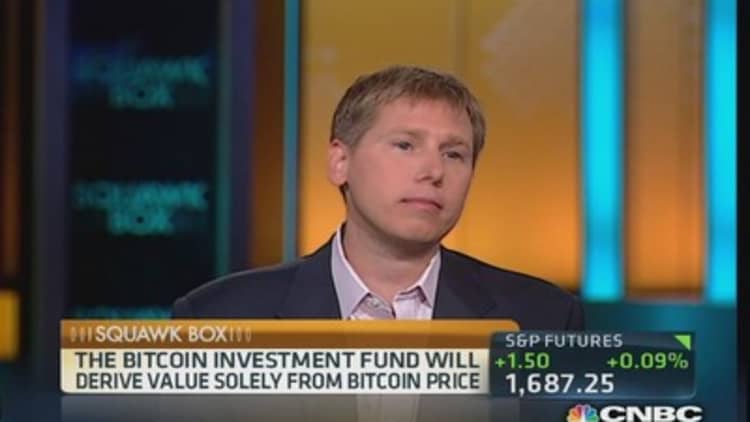Bitcoin, the virtual currency that stimulates as much excitement as fear, hit a new all-time high above $270 this week, breaking the previous record of $266 set in April. That April high came right before a crash in the virtual currency. ConvergEx Group's chief market strategist Nicholas Colas thinks this time investors can look into bitcoin's future and read the new high as a sign of its establishment, rather than a signal of one more looming crash.
The catalyst for the April bubble was an "overwhelming tulip-bulbish demand for bitcoin," Colas wrote in a note to clients, demand that exchanges couldn't keep up with. "Accounts froze or moved very slowly, and confidence in the currency dropped, along with the price." Since then, bitcoin developed "a lot more infrastructure to be a useful global currency," Colas wrote.
(Read more: Baidu now accepting bitcoins)
Back in September computer science researchers from UC San Diego showed that it was actually fairly easy to track individual transactions in the bitcoin transaction ledger. Just this week, academics at Cornell proposed that bitcoin could eventually be co-opted by a handful of 'miners' who could hijack the system.Nicolas ColasChief market strategist, ConvergEx Group
Bitcoin may have no central architecture, but in the time since the crash, the virtual currency's de-centralized architecture has increased in speed dramatically. Bitcoin "miners"—people who lend computing power to process Bitcoin transactions in exchange for a small bitcoin payment—were previously just hobbyists using personal computers. Today, bitcoin mining is a full blown ultra-competitive industry utilizing networks of computers with specialized hardware and the speed shows. The magnitude of speed across the bitcoin network has increased almost 80,000 times in speed since earlier this year, according to IEEE.org.
Additionally, mainstream merchants are slowly adopting bitcoin, replacing the void left by Silk Road's demise. The currency has even made steps into the physical realm, with ATM manufacturer launching the first bitcoin ATM in a Vancouver coffee shop.
(Read more: Paying cash costs Americans $200 billion a year)

These recent improvements reflect the steady rise in the bitcoin exchange rate, which Colas stated "actually has little to do with how much bitcoin is worth, but what it might be good for."
Many investors are thinking the same way. China is now home to the largest bitcoin exchange, but demand is still growing worldwide as well. Within the U.S., private share exchange Second Market is a major contributor to bitcoin demand. "There's no way to know how much Second Market has purchased on behalf of its clients," Colas wrote, "but it must be a popular offering—the banner ad on their site for the trust occupied the top third of their front page."
Colas argues that a crash like in April may be less of a concern as bitcoin matures than a broader and more damaging play for control of the virtual currency by a small group of traders. "Back in September computer science researchers from UC San Diego showed that it was actually fairly easy to track individual transactions in the bitcoin transaction ledger. Just this week, academics at Cornell proposed that bitcoin could eventually be co-opted by a handful of "miners" who could hijack the system."
(Read more: The next online shopping game-changer: The retinal scan)
Who is using bitcoin, in addition to the growing demand from China and Second Market?
ConvergEx offered some ideas:
•The obvious: "Tech savvy people, who by their nature and high-functioning professional skills tend to have a few shekels lying around? Yep—classic early adopters."
•The Ron Paul flock: "Then there might be independence-minded older white males in the U.S., ticked off by the Federal Reserve and government in general. Yes, they like the story as well."
•The nefarious: "And then there are the criminals—drug dealers and so forth—who might not know a creation myth from crystal meth, but appreciate the potential for secrecy."
•The one percent: "Offshore millionaires from essentially anywhere in the world, looking for classic diversification and a liquid investment. All you need to access your bitcoins is that long alphanumeric key and a local bank account which links to a 'Wallet'—an online repository to hold the currency. Deposit money in China, write down the key, fly to Monaco and go into an Internet café. Easy-peasy."
—By Roy Luo, CNBC Digital news intern




